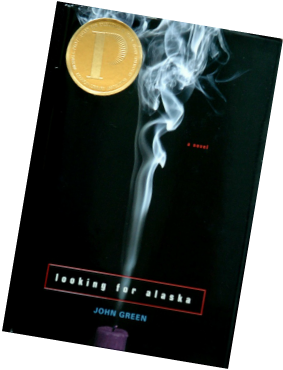 A slow-to-the punch, yet extremely gripping debut novel by John Green, Looking for Alaska, is one of those books which continue to affect us long after we have put it down. Separated into two parts - “BEFORE” and “AFTER” - with a twist in the middle, this novel asks and answers some tough, controversial questions.
Before: An unsocial sixteen-year-old, Miles Halter (Pudge) has a strange fascination with the last words of great men. Author François Rabelais' enigmatic last words “I go to seek a Great Perhaps” inspire the sixteen year-old to leave his safe life at home and enroll in Culver Creek, a co-ed boarding school in Alabama. Pudge is the stereotypical odd kid: chicken-leg skinny, undeniably bright, and a bit of an idealist at heart.
He is quickly befriended by a strange group of people - his roommate Chip, romantic Romanian girl Lara, with her strange habit of mispronouncing words with “I” and Takumi, a clever, humorous Japanese boy. They introduce her to Alaska, the beautiful girl who “had eyes that predisposed you to supporting her every endeavor.”
Alaska's carefree nature, everlasting smile and sly ways entice Pudge. He delves into a world he never imagined before - running away from classes, sneaking to the lake to grab cigarettes, pulling pranks constantly. Alaska is the embodiment of all things self-destructive and screwed up, but also the epitome of utmost beauty and by always living on the edge she launches Pudge into his long-awaited “Great Perhaps” and steals his heart in the meantime.
After: The purpose behind the slow, rambling and somewhat clichéd “before” section is revealed, as the course of the story is completely shifted and the deeper meanings are addressed. This thought-provoking, and spellbinding last section really makes every bit of this novel extraordinary. The characters spend their days trying to figure out the mystery which overshadowed their lives, and answer questions about the true meaning behind life.
It's surprising to critics that such an engaging, mature, and complex novel was directed towards high-school students, but Green's purpose was to help teenagers grow by introducing them to serious topics in an engaging way. “Looking for Alaska” is a book exploring religion and its applications to our own lives and thoughts. The book centers on Miles's lessons with Dr Hyde, a World Religion teacher who opens Miles's mind to consider the world through the ideals of religion and philosophy. He teaches him to be aware of the present, and listen and talk, rather than over-think the future.
Green was awarded the 2006 Michael L. Printz Award (for excellence in young adult literature) for “Looking for Alaska”, which is deserved by this gorgeously written, passionate and hilarious novel. The stories of these vividly beautifully portrayed characters - bad kids at times and touching at others - help readers deal with self discovery. The audience will be grinning, laughing and crying throughout the book but mainly they will fall in love with Alaska's vanilla-and-cigarettes scent and optimistic ways, and stay enticed till the very last page.
This book delivers a haunting narrative about teenage-hood and the mistakes and successes associated with it. It depicts love in all its many forms, and explores deeper themes such as where our ‘Great Perhaps’ lies. Looking for Alaska is a heart-wrenching, moving story that deserves a place at the top of your reading list
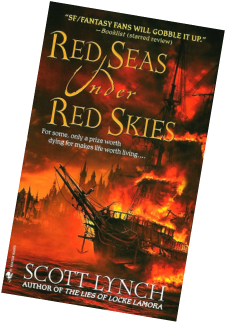 Certain authors manage to incite in the reader a level of enthusiasm that can be almost called zealotry. Look at what L Ron Hubbard achieved with his work. Not to say that Lynch will go on to create a cult of his own called Monkeyshineology. But Lynch does write better, if not just as well, as Hubbard ever did.
The events of the first book left the reader in somewhat of a lurch. While appreciative of Locke Lamora and Jean Tannen's sheer audacity in the face of the odds against them, one does feel saddened by the departure from Camorr. There is this feeling of unfinished business left behind in the city. The second book ostensibly takes place in Camorr's rival city state, Tal Verrar.
Lynch's talent in world building shows through again with this new city, which is markedly different from the claustrophobic, Venice-like Camorr. He manages to instill enough ambience and character to make the city seem like a place we know, or at least once knew. There are familiar truths mixed in with the fantastical descriptions that make everything you imagine feel on this side of real.
In this installment of the Gentlemen Bastards, the reader is shown how Locke Lamora and Jean Tannen have made for themselves a nice little niche in the gambling houses of Tal Verrar, conning honest and dishonest gamblers. Their ultimate goal is of course to land themselves a big fortune, by cheating someone else out of theirs. Like always, the complete lack of anything resembling a conscience in the face of
their own benefit makes these characters all the more interesting. Especially when considering the slew of honest and noble characters that one finds in every other fantasy series.
Unlike the first book, where Lynch focused primarily on creating a world full of organized crime, territorial in their activities all bowing down to an overarching overlord; this book focuses on a more disparate element of the criminal world. Pirates. Through a sequence of events that sometimes prove to be both hilarious and devious, the Gentlemen Bastards end up on a pirate ship. And learn to be pirates. And then become pirates. The one area of stealing that they hadn't taken part in before during their rather rigorous training.
The story is somewhat less complicated than the last one, mostly because Lynch seems to have learned from his mistakes. Instead of haphazardly shifting between the past and the present, which he still does, he has learned how to pace each segment so that the book doesn't feel hacked together. There are more villains that Locke and Jean have to deal with and the villains themselves are refreshingly different and colorful in their own rights and the readers learn to hate them so. Added to this is the fact that the Bastards haven't really managed to escape their past, or the fact that deep down, they are still Camorri. They need revenge for every slight ever dealt to them.
Fantasy books are renowned for their size and heft. Lynch doesn't seem to need three hundred thousand words to tell a huge story. He has a sense of brevity, managing to tell a far longer story than one would have anticipated. And he leaves the reader once again with the feeling that there was so much more the characters could have done in Tal Verrar.
Read this book. If only because we need to one day create Monkeyshineology. Tom Cruise would donate his eyes to monkeyshine.
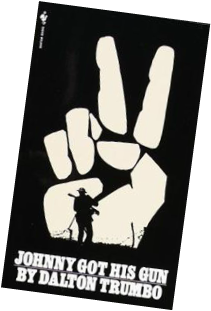 You may be the most imaginative person in the world and yet it would be difficult for you to place yourself in Joe Bonham's shoes. What is life like when you have no limbs, can't see, hear or communicate in any way - half your face blown away and you are not even sure if you are, at any particular moment, dreaming or not. Dubbed the Most Original Book of 1939, Johnny Got His Gun follows the story of a young soldier drafted to fight the First World War and his life as a permanent patient in a hospital where he is lying after being hit by an artillery shell.
The book consists of basically what Joe is thinking - so there's no outside perspective of what is actually happening. The highlight of the book is his realisation and his attempts at accepting his situation.
The book has a very pacifist voice, and was even used as a point to stop involvement in wars. It describes Joe's childhood, his parents, the time he went fishing, his short adolescent love life and in the middle of one these jumbles memories he realises he has no arms. They must have had to chop it off. And when he feels top heavy and sinking, he eventually realises he has no legs either. No face, breathing through a tube. And he wonders in astonishment at being still alive - people leave hospitals without arms, legs, sometimes faces gets blown off - but they live. But how could all the worst possibilities happen to him all at once - and he realises that one miniscule probability exists to whom the worst possible can happen.
He tries to keep himself busy, to get a grasp of time, to count the days, weeks and years which pass by with him as a vegetable. With nothing to do but think, he comes to the conclusion that life is too precious to waste fighting someone else's war to the point he gets aggressive in his mind about the benefit of democracy to the man dead or incapacitated like him.
His attempts of communicating succeed one day, thanks to a nurse. Using Morse code which he used as a kid to talk to a childhood friend on rainy days, he finally gets through. He begs the doctors to kill him and after a while he understand that he would rather live, even if as a circus freak enclosed in a glass case to be shown to the world as the horrors of war.
The book is extremely touching, to the point that in one scene Joe drifts between dream and reality and imagines a rat biting away at his side while he can't do anything about it, can't shake it off, can't cry for help, you imagine his plight and just want to get through the part and know that he is alright.
Dalton Trumbo writes in a very uncharacteristic way for his time, a little reminiscent of Hemingway. Short sentences, no punctuation, drifting between reality and dream, sudden shifts of memories - all of these make the book all the more wonderful. It's a very fast read and gets the point across about war. The book is a classic and though not many know of it, the story should be familiar to all fans of Metallica. Their song 'One', was written based on the book, and the music video uses actual footage from the movie. And for someone who likes the song, the book will induce a few smiles as you find the lines taken verbatim. And in case you are wondering, the title of the book is a play on “Johnny get your gun” - a sentence which was used to encourage the young men to join the army.
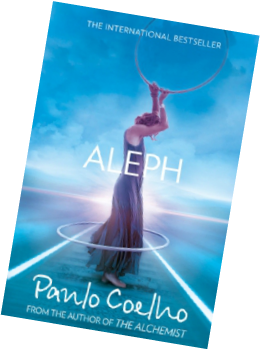
'ALEPH' takes the readers on a journey spanning the 9288 km of the Trans-Siberian railway and guides them on a trip through space and time. The story is about Paulo, a renowned writer, who embarks on this journey in search of his spiritual peace.
The story starts with Paulo confessing to his mentor, J, his disappointments with life and the Tradition, which he learned for years. On his advice, Paulo starts travelling through the continents of Africa, Europe and Asia, signing books, meeting readers and slowly conquering his kingdom.
Filled with euphoria, he commits to a train-ride through Russia. He meets Hilal, a beautiful young woman and violin virtuoso, during his sojourn in Moscow. She claims that they were destined to meet and that she had the answers to all of Paulo's questions. Soon he realises that Hilal was the key to his spiritual expedition.
Despite the constant disapprovals of his editor and publisher, he lets Hilal tag along. He discovers that they were entangled in a spiritual web of love 500 years back, when they entered the Aleph, a parallel dimension where there is no past or future but all is present. Over the course of the journey, the story of their past unravels; he unlocks the secrets with the help of Hilal, and discovers that he betrayed her in their past lives.
The tension increases near the end where the two protagonists find themselves in love with each other in their current lives. But their romantic desires need to be broken in order to carry on with their separate lives.
Throughout the story, Paulo talks about spiritual concepts including incarnations. A person will somehow relive the incidents that happened in his past lives, till nirvana is reached.
Aleph is a story of love, forgiveness and spiritual enlightenment. It is the most personal book of his till date. If you haven't read Paulo Coelho's books before 'The Alchemist; would be a good start. His books speak to those who take life as the train and not the station. These tell the stories of Paulo himself, of the characters and of us.
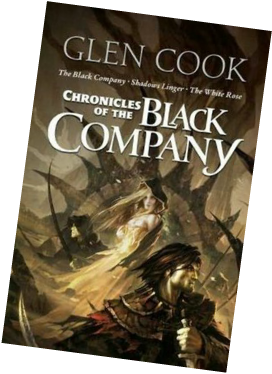 Every once in a while we come across one of those brilliant books which completely redefines the genre it's supposed to depict. The black company series, considered as Glen Cook's masterpiece is one of those, which without a doubt will change your view of fantasy novels and will introduce readers to a tainted and besmirched world where darkness itself fights against the minions of shadow for survival and the basic human instincts like fear and self preservation triumphs over honour and duty.
Chronicles of the Black Company is the first volume of the series consisting of the first three books. "The Black Company" first published in 1984 deals with the introduction of the black company, an elite band of mercenaries and the last of the free companies of Khatovar. Cook wastes no time in giving away backgrounds for his characters and took readers directly into the middle of a civil war where the black company is hired by the local ruler as his body guard. However, the members of the company realises that their mission is hopeless as they begin losing members everyday and are saved by the arrival of a mystic who promises to assassinate their current employer and free them of their present obligation and serve a new employer. However, the company soon realises that they just jumped into the fire when they figure out that their new employer is none other than "The Soulcatcher," an infamous sorceress under the service of "The Lady" who plans to rule the world by means of her dark sorcery.
The book, written from the point of view of Croaker, the company's physician and annalist, makes it pretty straightforward. Readers are allowed to know only the information Croaker could get his hands on and in many cases, important events like the result of a prominent battle which occurred in a simultaneous timeline are not known until Croaker is informed about them, making the plot extremely thrilling. Although, one might doubt how much a fantasy novel based exclusively on battles can be viewed from a first person point of view but you'll be surprised at the amount of action Croaker gets to be a part of.
The second book "Shadows Linger" released in the same year puts up a rather battle worn black company with their numbers dwindling and yet constantly called out to different regions to exterminate rebellion against the Lady's empire. However, an old evil, the Dominator is stirring in his eternal prison and even the powerful Lady is helpless against his might. She orders her favourite band to travel further north to investigate and extinguish any chance of his reawakening before he gathers his full strength.
Besides Croaker, readers will find a new p.o.v from another character that Cook has created with great detail. Shed, one of the most interesting characters of the book gets almost half the book to himself and acts as a much needed distraction from the constant battles fought by the company.
In "The White Rose " (1985), we find the black company in a perilous situation as they constantly strive for their survival and also support the white rose, who is supposedly the only person who can defeat both the lady and the dominator once and for all.
As mentioned earlier, the plot is one of a kind. Glenn Cook, a veteran of the Vietnam War executes his knowledge of warfare to every detail possible even though the timeline and technology is dramatically different. The story is compassionate in every possible way as the soldiers of the black company constantly question their involvement in such massacres but do their duty to the letter. Even though the writer completed his books without describing too much about the characters, the ones he did prioritise on had finesse and depth. The book constantly jumps from one battle to another and if you're familiar with Steven Erikson's Malazan Book of the Fallen, you'll feel right at home with this series.
Overall, the series does not portray the age old cliché of good against evil, rather Glenn Cook shows his genius by proving that there is no glorious war. Blood is shed on both sides as the number of casualties increase and even the characters you like most can die like a foot soldier on the frontier. The book is a good investment not only as a good read but as a collectible as well.
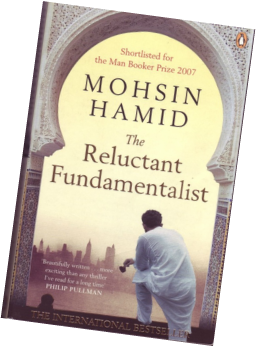 "I responded to the gravity of an invisible moon at my core, and I undertook journeys I had not expected to take.”
The latter part of the above quote from the book describes perfectly how I felt after turning the final page of The Reluctant Fundamentalist by Mohsin Hamid. No one can blame me for assuming it was anything but a thriller given the title. Which only goes to show that one should never judge a book by its cover.
The story is told in monologue by the protagonist, Changez, to an unnamed American man in a busy Lahore café while dusk is settling in. The two are strangers and the foreigner appears to be at unease with this apparent chance-meet and the almost forced hospitality of this Pakistani man who narrates his life-story to him, that too, in excellent English.
Changez tells him (and us) of how he graduates from Princeton and finds himself living the American dream with a highly-paid job at a valuation firm and a lovely, but troubled love-interest, Erica. He suffers from identity crisis like so many other migrants but quickly makes his niche among New York's elite. Then 9/11 happens, and his world changes, along with the world itself.
The beauty of the novel lies in the effortless story-telling, almost musical in a way, which engages the reader's attention from the very first line, and keeps a tight hold of it throughout. There are no bombs and no guns- but the tension is suffocating. The reader is often made to feel that the two strangers may be enemies of sorts and this makes one jump to all kinds of strange conclusions about the end of the evening, while the writer leads you on to an ingenious little twist. Mohsin Hamid skilfully uses the power of understatement to create in the mind of the reader a sense of urgency that lasts till the ending words.
This is a rare piece of literary fiction which has made it to the international best-seller list. Maybe it's because of how closely, almost personally, the writer talks about the bipolar world following 9/11. Hamid is also a Princeton graduate, born in Pakistan but with his childhood years in the States. Maybe it's because you can't help but take a side, either for or against Changez, who is brute in his honesty and open about his idiosyncrasies. Or maybe it's just because Changez is an incredibly real man who, over an afternoon cup of tea, defines the conflicts of the past decade.
A must read for anyone and everyone who looks for intrigue in a book and likes to be left thinking.
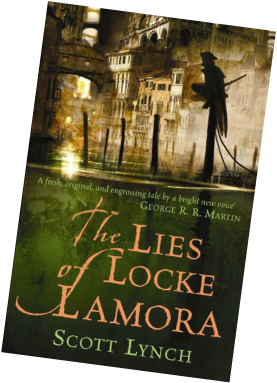 What do you get when you mix a fireman with a wordsmith? You get Scott Lynch. Not only is he manly enough to walk into burning buildings and come out of it with his overlong hair intact, but he manages to quip off colour limericks while rescuing babies. Or at least one imagines that he does, if his books are any indicator of his character and manliness.
And to be honest, that's exactly the draw that makes Lynch's debut book, The Lies of Locke Lamora so appealing. It doesn't pander to the tropes of regular fantasy. It doesn't adhere to the rules of the good and noble hero. Lynch went and wrote a book where the characters are as flawed as they come, mostly because they happen to be self-serving to a T.
The story focuses on the dark and grimy underworld of Camorr, a city that's divided into islands and is crisscrossed with the canals formed by the estuary it sits on. The city itself can be considered to be a superb character, adding flavour and ambience to the story and leaving an indelible impression in its wake. If anything, Lynch should be commended on his innovative approach to world building. We are introduced at the very beginning to Locke Lamora, a sneak thief who suffers from the curious predicament of “stealing too much”. Lamora is a character who is delightfully deficient of any morals when it comes to self-gain and yet manages to be likeable enough that you become instantly a fan.
We see Locke join the Gentleman Bastards, a group of conmen intent on fooling both the nobility and the fraudulent out of their gold and sometimes their tables. Lynch uses the premise of the young thieves being trained in the art of corruption as a way to introduce us to the general storyline and the political and social world at large. Not only that, but by interspersing the 'past' and the 'present', Lynch manages a near metaphorical non-linear arc that constantly teases and surprises the reader.
We are made privy to the Gentlemen Bastards in the present, as young, successful thieves stealing larger and larger amounts from gullible marks. Through them, we see the war broiling in the underworld of Camorr; between Capa Barsavi, the Mafia-esque don, and the Gray King, a pretender to the throne. The reader is also shown the Gentlemen in their formative years and once again the characters are used to show the larger picture of Camorr. The young thieves, fumbling through their steep learning curves, show us how The Secret Peace was set up in Camorr, how the underworld became so pervasive and structured that it worked like clockwork. And once again, we see grown men, including Lamora, witnessing the crumbling of the edifice from very personal standpoints. The story is complex and eventful enough that the review cannot fully offer a gist of it without wilfully spoiling a choice angle. So let's leave it be.
Scott Lynch, as a first time writer exhibits enough charm and poise and that at times one forgets that this is a debut. However, there are reminders here and there that do speak to the author's relative inexperience. The interludes can be - and are sometimes - jarring and there are instances when the transition from one scene to the next is not quite seamless. The speech patterns of the characters, especially amongst the Gentlemen, do tend to veer towards sameness. Even though their sarcastic banter is enjoyable, one does wonder if it isn't just Lynch spewing his own spiel. Near the end of the book, there is a distinct feeling of 'rush', as if Lynch was so excited to bring his brilliant plan to a close and show off the cards he'd dealt, that he forgot to slowly build up to them. But, Lynch can be forgiven, simply because even when he makes mistakes he makes them doing new things. You can't blame a guy for trying. Especially when he's a fireman.
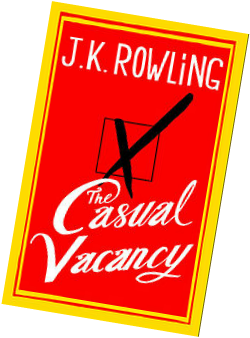 When you open Casual Vacancy by J.K Rowling, you think the world has been set right again. Finally people can focus on a real writer and not that ‘Fifty Shades of Garbage’ that everyone and their mother seem to be gushing over. You expect to place yourself at the hands of a trusted storyteller and an old friend.
Oh, but Hedwig, I have a feeling we are not in Hogwarts anymore.
Casual Vacancy had it's debut a couple of weeks ago to mixed reviews, most of which haven’t been the best. It’s hard for a Harry Potter fan to be objective about anything that Rowling has written, but can you really still love her blindly if it’s just plain bad writing?
The story is set in the small idyllic town of Pagford, where councilman Barry Fairbrother drops dead in a golf club creating a “casual vacancy” - that’s the technical term for these things, apparently - for someone to fill. Fairbrother, it is soon revealed, was working on a housing project on the outskirts of town called The Fields which wasn't being too well received by the town’s gossipy, stuffy, upper middle class residents, and upon the news of this death, it’s a scramble for his place in the council to either continue or abolish these plans. Will it be Colin Wall, deputy headmaster of Winterdown Comprehensive, who wants to continue Barry's good work? Or will it be Miles Mollinson, leader of the group that would turn its back on The Fields? It might even be Simon Price, who's under the impression that Barry was taking kickbacks, and wants to do the same.
Sounds dull, doesn't it? That’s because it is. It’s not fair on JK Rowling to compare this to Harry Potter - let’s face it though; fans are going to be doing it anyways - but even if you start it with an open mind, it still won’t change the fact that the book is quite boring and somewhat badly written. Aren't you supposed to be getting better at this after seven books, Ms Rowling?
The redeeming qualities come from the teenagers and their drama filled gossip girl-esque (but without the couture and the Louboutins) lives, this is where the book gets somewhat interesting - but not till page 242!
The book is number 2 on the New York Times bestseller list (but then again, all three of E. L. James books are in the top 6) so it’s worth a read if you have nothing better to do this coming vacation. Just don’t be too disappointed because it’s about as far from Harry Potter as you can possibly get.
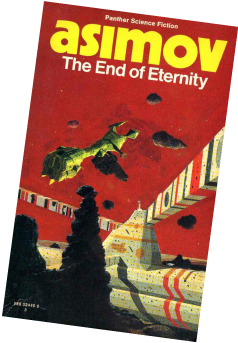
Most sci-fi fans are already familiar with Asimov; he is a mastermind in the field. With renowned best sellers like I,Robot and The Foundation Saga to his credit, this Russian-American writer has made fantasy worlds wholly from his PhD endorsed science-y knowledge. Yours truly though was fresh to the entire scene of Asimov influenced sci-fi fandom, hence the initiation into the alliance with 'The End of Eternity'.
The first two pages of the book: complete jargon which makes no sense. If you get past that, things start falling into place and soon you start picking up pace because the book really draws you in at one point. The antagonist, Andrew Harlan, is an emotionless time traveller who has been trained to be dispassionate to everything, a quality essentially required for his job. That is until he meets this woman, Noÿs Lambert, who changes everything about him and around him and makes him willing enough to put all that previously mattered to him in retrospect. Oh, the vigour of love.
Well, the plot sounds pretty cliché but as any Asimov fan will tell you, nothing is usually what it seems and the book is full of enough twists to change your opinion. Asimov's abilities lie in telling compelling a story through the overarching circumstances. While the story seems a little shallow from time to time, the ideas he talks about, weaving sentiment in between his nifty scientific logic about time travel, dimensions and parallel realities is an absolute treat to the reader.
On a more superficial basis, the writer does paint an intricate caricature of the antagonist who is an absolute hotshot to fall in love with. Not the regular jerky handsome kind, but the mild intelligent one.
I'll be honest though, the book might not appeal to all sorts of readers but as far as this reviewer is concerned, this sci-fi romantic thirller is worth a shot. Just for the record, it makes for a great reading if you are travelling; the long hours of attention helps in understanding the story better.
|









 RSS Feed
RSS Feed